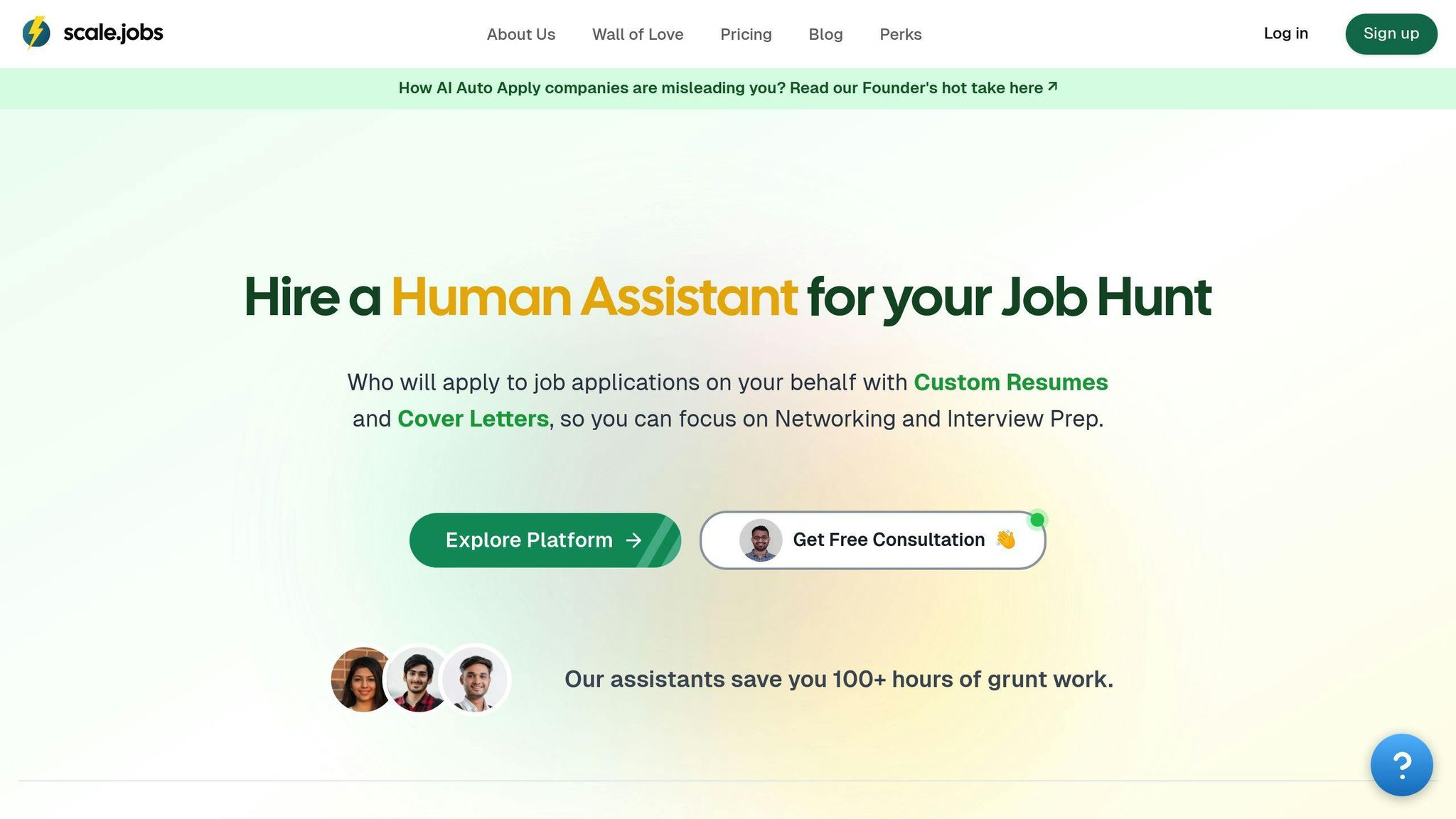8 Stress Management Tips for Job Seekers
Explore practical strategies to manage stress during your job search, from mindfulness techniques to time management tips.

Job hunting can be overwhelming, but managing stress is key to staying focused and confident. Here are 8 practical tips to help you stay calm and organized:
- Deep Breathing: Use techniques like the 4-7-8 method to ease anxiety.
- Mindfulness & Meditation: Stay present and reduce worries with daily meditation.
- Time Management: Plan your day with clear goals and use tools like Trello to stay organized.
- Progressive Muscle Relaxation (PMR): Relieve physical tension by tensing and relaxing muscle groups.
- Healthy Lifestyle: Exercise, eat well, and get enough sleep to boost your energy and mood.
- Set Boundaries: Create a routine, limit job search hours, and prioritize self-care.
- Use Application Services: Delegate repetitive tasks with tools like Scale.jobs to save time.
- Practice Gratitude: Focus on small wins and reframe setbacks as opportunities to learn.
These strategies can help you stay balanced and resilient throughout your job search. Ready to dive deeper? Let’s explore how to apply these tips effectively.
The Best Way to Handle Job Search Stress
1. Use Deep Breathing Exercises
Deep breathing is a simple yet effective way to ease job search stress. It can help you stay calm during nerve-wracking moments, like preparing for an interview or dealing with rejection emails.
One popular method is the 4-7-8 technique: breathe in for 4 seconds, hold your breath for 7 seconds, and exhale slowly for 8 seconds. This approach works well in high-pressure situations - whether you're about to walk into an interview, hitting "submit" on an application, or taking a break in a hectic day.
What makes deep breathing so helpful is its flexibility. You can use it before networking events, during stressful moments, or anytime you need to regain focus. Practicing regularly can help you stay composed and focused, even when facing setbacks or juggling a packed schedule.
To get the most out of it, try adding short deep-breathing sessions to your daily routine. These can fit nicely between job search tasks. Pairing it with other techniques, like progressive muscle relaxation, can make it even more effective.
Once you're comfortable with deep breathing, you might want to explore mindfulness techniques to amplify its calming effects.
2. Try Mindfulness and Meditation
Mindfulness and meditation can help you stay calm and focused during your job search. These practices keep your attention in the present moment, reducing worries about what might happen next and allowing you to handle tasks with a clear mind.
"Mindfulness is paying attention in a particular way: on purpose, in the present moment, and nonjudgmentally".
Here are a few ways to bring mindfulness into your daily routine:
- Start Your Day Right: Spend 10 minutes meditating in the morning to set a calm and positive tone for the day.
- Be Present with Applications: Take time to carefully read job descriptions before deciding if they’re a good fit.
- Visualize Success: Dedicate 5 minutes to imagining yourself confidently navigating interviews.
Mindfulness can also help you handle rejection emails with a level head and build resilience. It’s a great way to stay focused when writing applications or networking, ensuring you bring your best self to each task.
Before interviews, practicing mindful breathing can help you stay calm and collected, even in high-pressure situations. Over time, mindfulness can improve emotional control and help you present yourself authentically during important career discussions.
Once mindfulness becomes second nature, you can combine it with strategies like better time management to further reduce job search stress.
3. Focus on Time Management
Managing your time well during a job search can help you stay organized and reduce stress. The U.S. Department of Labor Statistics reports that the average job search lasts 4.6 months, so creating a routine you can stick to is key.
Plan Your Day with Purpose
Break your day into specific time blocks for tasks like updating your resume in the morning, networking in the afternoon, and building new skills in the evening. Match these tasks to your energy levels for better productivity.
Leverage Helpful Tools
Apps like Trello or Todoist can keep you on track by organizing your applications, deadlines, and networking contacts. These tools make it easier to stay on top of everything without feeling overwhelmed.
Set Goals and Prioritize Balance
Aim for clear, manageable daily goals, such as spending 2-3 hours on job search activities. Balance this with breaks for self-care to avoid burnout. Staying connected with your personal and professional networks can also help you feel more motivated and less isolated during the process.
Be ready to adjust your schedule as needed to stay effective. Adding relaxation techniques, like meditation or progressive muscle relaxation, can help you stay calm and focused as you navigate the job search.
4. Practice Progressive Muscle Relaxation
Progressive muscle relaxation (PMR) is a great way to ease the physical tension that often comes with job searching. It can help counter the strain from long hours in front of a screen and the jitters that come with interviews.
How It Works
Find a quiet, comfortable spot to get started. The method is simple: tense each muscle group for 5-10 seconds, then relax them for 10-15 seconds. This process helps your body let go of built-up stress.
Step-by-Step Approach
Move through your body in order, starting at your feet and working your way up. Focus on each area: feet, calves, thighs, hips, back, shoulders, arms, hands, neck, and finally, your head.
Best Times to Use PMR
Practicing PMR daily at the same time can provide consistent stress relief. It’s especially helpful before interviews, networking events, or even after hearing back about job applications. If you’re using tools like Scale.jobs to streamline your application process, consider using the extra time for a quick 10-15 minute PMR session.
Boosting Its Effectiveness
Add deep breathing to your PMR routine for even better results. This combo taps into your body’s relaxation response, easing both physical and mental tension.
Feeling more relaxed and less stressed can make a big difference during your job search, and sticking to healthy habits will only make you more resilient along the way.
5. Keep a Healthy Lifestyle
Taking care of your health is key when dealing with the ups and downs of job hunting. The American Psychological Association highlights that regular exercise can lower stress and anxiety by releasing endorphins, often called "feel-good" hormones. This natural boost can help you stay calm and focused.
Stay Active and Rested
Try to fit in 30 minutes of exercise daily, like a brisk walk during your lunch break - it’s a great way to clear your mind. If you're using tools like Scale.jobs to streamline your job applications, use that extra time for activities like stretching or walking to keep your energy up. Also, aim for 7-9 hours of good-quality sleep each night. A consistent bedtime routine can help, even if you're tempted to stay up late scrolling through job postings.
Eat for Energy and Focus
What you eat can directly impact your mood and energy. Include foods that help reduce stress and keep you energized. For example, oatmeal with walnuts makes a great breakfast, salmon with leafy greens works well for lunch, and fresh fruits or nuts are excellent snack options.
Set Practical Health Goals
The U.S. Department of Labor Statistics notes that the average job search takes about 4.6 months. To stay on track, focus on small, manageable changes. Add a quick 10-minute walk to your day or swap out processed snacks for fresh fruit. Staying active, eating well, and getting enough sleep can help you handle the stress that comes with job searching.
Taking care of your health not only boosts your physical and mental well-being but also helps you manage your time and energy more effectively during this challenging period.
6. Set Clear Boundaries
Setting boundaries while job hunting can help you stay productive and lower stress. Studies suggest that job seekers who stick to clear boundaries experience less stress and get more done overall.
Establish a Routine
Dedicate 4-5 hours a day to job search tasks, ideally during regular business hours. Create a workspace specifically for job hunting - away from where you relax or sleep. This helps your brain switch between "work mode" and "rest mode." When your work time is up, physically leave this space to mark the end of your job search for the day.
Use Technology Wisely
Be intentional about your digital habits to stay focused and reduce anxiety. Tools like Scale.jobs can take care of time-consuming tasks like applications and cover letters, giving you more time for networking and interview prep. Check job-related emails and notifications only 2-3 times a day to avoid the stress of constant updates.
Prioritize Your Well-Being
Set aside time for activities that help you recharge - whether it’s exercising, reading, or spending time with loved ones. This balance keeps you grounded and prevents burnout. Boundaries aren’t just about managing your schedule; they’re about saving your mental energy for what truly matters.
7. Use Job Application Services like Scale.jobs

Job hunting can feel like a full-time job in itself, especially when juggling multiple applications, resumes, and deadlines. Professional application services can help lighten the load and keep you on track.
Simplify Your Search
Services like Scale.jobs offer virtual assistants for just $4/hour to take care of repetitive tasks. This frees up your time and energy for the parts of your job search that matter most, like networking or interview prep. By delegating, you can avoid burnout and stay focused on your goals.
Prioritize What Matters
When someone else handles the tedious work, you can spend more time on things that truly make a difference:
- Building relationships with industry contacts
- Practicing for interviews
- Learning new skills
- Balancing your personal life
Stay Organized and Confident
Many of these services include tools to keep you organized, such as applicant tracking systems (ATS) checkers, application trackers, and document generators. Scale.jobs even offers these tools for free, making it easier to stay on top of your search and feel more confident about your applications.
Work Smarter, Not Harder
Experts agree that delegating routine tasks can lead to better outcomes and less stress. It’s not just about saving time - it’s about keeping your mind clear and focused so you can perform at your best throughout the process.
8. Reflect on Gratitude
When navigating the challenges of a job search, focusing on gratitude can help reduce stress and keep you motivated. Shifting your perspective to what you’re thankful for can turn frustration into a source of energy and inspiration.
Celebrate Small Wins
Take time to recognize and record milestones in your job search, whether it's submitting an application, landing an interview, or building new connections. Research shows that even small gratitude practices can ease job search anxiety and boost your mood.
Create a Gratitude Habit
Build a simple routine to incorporate gratitude into your day:
- Start each morning by thinking of one positive aspect of your job search.
- Keep track of your progress, no matter how small, as you go through applications.
- End your day by listing three things you're thankful for.
Reframe Setbacks
Instead of seeing rejections as failures, try viewing them as opportunities to learn. Focus on the skills you’ve gained or the feedback you’ve received. This mindset can help you stay resilient and ready for the next opportunity.
Show Appreciation
Thank the people who support you, whether they’re mentors, friends, or colleagues. A simple expression of gratitude can strengthen relationships and keep your spirits high.
Combine Gratitude with Other Techniques
Pairing gratitude with mindfulness exercises or progressive muscle relaxation (PMR) can amplify its calming effects. This combination offers a more balanced way to handle the stress of job searching.
Conclusion
Job searching can be tough, and managing stress is key to staying focused and resilient. With the average job search taking about 4.6 months, it's important to have strategies in place to help you maintain your balance.
Stress Management Techniques
Simple practices like deep breathing exercises, such as the 4-7-8 technique, can provide quick relief during tense moments. Regular mindfulness exercises can help build long-term resilience. Pair these with healthy boundaries and lifestyle habits to create a solid foundation for staying emotionally steady throughout your search.
Using Resources Wisely
While personal techniques are essential, don’t overlook the support systems available to you. Services like Scale.jobs can take care of tedious application tasks, freeing up your time for networking, preparing for interviews, or simply taking care of yourself. This approach helps you maintain the mental clarity and focus needed to shine during the hiring process.
Building a Routine That Works
Incorporate these practices into your daily life rather than treating them as quick fixes. A mix of mindfulness, regular exercise, and smart time management can lower anxiety and boost your performance. If you’re still feeling overwhelmed, consider reaching out for extra help through career counseling or mental health professionals.
FAQs
How to cope when you're unemployed?
Dealing with the emotions tied to job loss is a crucial first step. Pair this with a structured daily routine that includes exercise, dedicated job search time, and self-care. This approach keeps you productive while also managing the emotional challenges that come with unemployment.
Stay engaged in your field by volunteering, joining online communities, or taking relevant courses. These activities not only help you maintain your skills but also combat feelings of isolation. Considering that the average job search lasts about 4.6 months, staying professionally active can boost your confidence and keep you focused.
Tips for Managing Stress:
- Practice deep breathing to ease tense moments
- Go for a 30-minute walk each day
- Stick to a regular sleep schedule
- Eat nutrient-rich foods to support your mood and concentration (See Section 5 for details)
Seeking help from career counselors or mental health professionals is a proactive step. These resources can offer guidance and strategies to help you navigate this challenging time.




